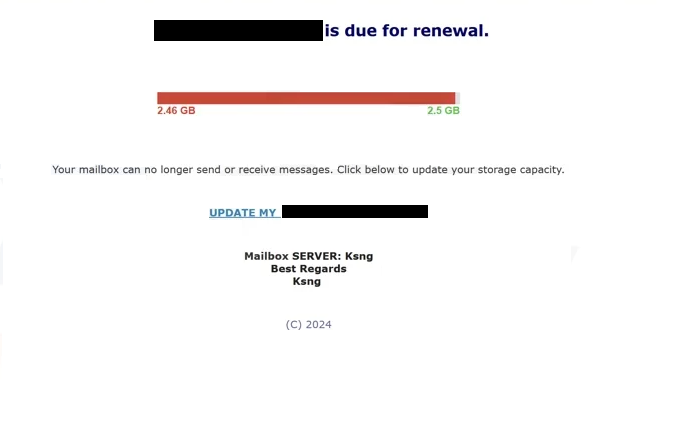What is the “Email Is Due For Renewal” phishing email
“Email Is Due For Renewal” email is a phishing scam email that claims your email account’s storage is full and you can no longer send or receive emails. This email is a phishing attempt that tries to steal users’ email account login credentials.
“Email Is Due For Renewal” emails are part of a phishing campaign that tries to steal users’ email login credentials. It’s a classic example of a phishing scam. The email does not have a lot of text and has minimal information. It only informs the recipient that their email account “is due for renewal” because 2.45GB out of 2.5GB of storage has been used up. Supposedly, the email account will not be able to receive or send emails because of this.
Subject: – Please confirm to continue.
… is due for renewal.
2.46 GB 2.5 GB
Your mailbox can no longer send or receive messages. Click below to update your storage capacity.
UPDATE MY …
Mailbox SERVER: Ksng
Best Regards
Ksng(C) 2024
The email contains a link to supposedly update the email account and get more storage. If users click on it, they will be taken to a phishing site that asks users to type in their email addresses and their email passwords. As soon as users submit their login credentials, they will be transferred to cybercriminals operating this phishing campaign. Cybercriminals may use the credentials themselves or sell them to other malicious actors. Email login credentials are in high demand among cybercriminals because they’re connected to many other accounts and contain highly important information.
How to recognize phishing emails?
Phishing emails that target many users with the same email are usually easily identifiable. Such emails are very generic, do not contain any information that would make them credible, and are full of mistakes. However, when malicious actors target someone specific, they make the emails much more sophisticated.
One of the first things users should do when they receive an unsolicited email that asks them to perform some action (click on a link, open an attachment, etc.) is check the sender’s email address. A simple search with Google is usually enough to determine whether the email address belongs to whomever the sender claims to be. In very low-effort malicious email campaigns, the email addresses would be immediately obvious because they would look random. Some malicious actors may use deceptive tactics to make the email addresses seem more legitimate. For example, the letters “r” and “n” may be used instead of “m” to imitate a legitimate email address. Additional letters may also be added. For example, an additional “f” may be added to make an address look like it belongs to Netflix.
Another thing to pay attention to is grammar/spelling mistakes. In many cases, phishing emails are full of grammar and spelling mistakes. While this particular “Email Is Due For Renewal” phishing email does not have enough text to have mistakes, it’s still worth mentioning because most other emails will have them.
Users should also never rush to perform an action like clicking on a link or opening an email attachment. Users should first carefully inspect the email and use logic to determine whether it’s possible for them to receive such an email. For example, this “Email Is Due For Renewal” email is very obviously fake if logic is used. First of all, there is no need to ‘renew’ email addresses, no matter what is the email service provider. And second, email service providers do not send out emails to users whose storage is almost full. Users are informed in the email account itself, not in an email.
Lastly, when it comes to emails with links, it’s recommended to not click on any links. If there’s an issue with some account that needs addressing, users should access the account manually instead of clicking on a link. For example, if users receive an email from Netflix about a failed payment, they should access the account and fix the issue manually, not via the link.
“Email Is Due For Renewal” phishing email removal
If users receive this email in their inbox, they can just remove “Email Is Due For Renewal” phishing email from their inbox. If users have interacted with the email and typed in their email login credentials, they need to change their passwords immediately if the account can still be accessed. It’s also a good idea to check account activities and see if any unauthorized logins have been made. If the email account has been hijacked already, contacting the email service provider is the only way to get the account back.
Site Disclaimer
WiperSoft.com is not sponsored, affiliated, linked to or owned by malware developers or distributors that are referred to in this article. The article does NOT endorse or promote malicious programs. The intention behind it is to present useful information that will help users to detect and eliminate malware from their computer by using WiperSoft and/or the manual removal guide.
The article should only be used for educational purposes. If you follow the instructions provided in the article, you agree to be bound by this disclaimer. We do not guarantee that the article will aid you in completely removing the malware from your PC. Malicious programs are constantly developing, which is why it is not always easy or possible to clean the computer by using only the manual removal guide.

